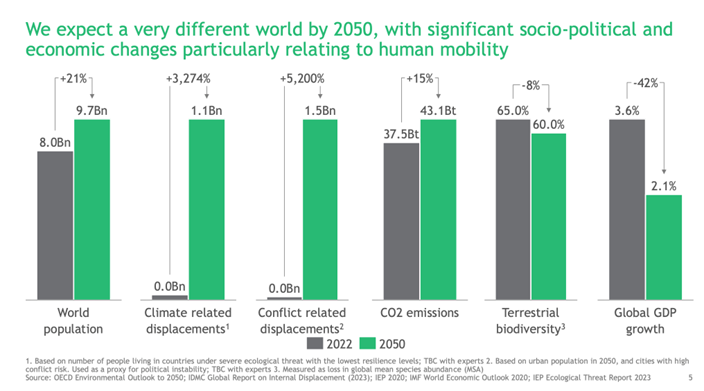The Growing Impact of Climate Mobility on Water Management
The number of people displaced internally due to climate hazards is projected to increase by more than 30% by 2050. This trend highlights the urgent need for a shift in our current approach to water management, as the effects of climate mobility are likely to be exacerbated without proper intervention.
Water resilience and social resilience must be integrated as strategic priorities across sectors to mitigate the impacts of climate mobility. Failure to address these issues will not only lead to environmental consequences but also strain the social contract between governments and citizens.
Communities will be forced to “follow the water,” driving scarcity and impacting resource planning. This will place additional constraints on water infrastructure and necessitate changes in town planning and resource management.
Governments that fail to develop robust strategic responses to climate change and the water infrastructure crisis will increasingly face challenges with their populations in the coming decades. This disruption to the social contract will extend beyond service interruptions and supply issues, influencing where people choose to live, establish businesses, and invest in key economic sectors.
Dean Muruven, Associate Director of Boston Consulting Group (BCG), emphasized the complexity of the water issue, noting that access to water is a fundamental human right. Simply increasing private sector participation will not solve the underlying challenges.
Research from BCG’s report “To understand climate mobility, follow the water” indicates that the current approach to water management is insufficient and could worsen the effects of climate mobility. In Africa, where 12 of the top 50 most water-stressed countries are located, the impact of climate mobility on water resources is particularly acute.
In water-scarce countries like South Africa, the movement of people in search of water will strain existing infrastructure and necessitate new approaches to resource management. The continent faces higher increases in climate mobility from flood risk than drought risk by 2050, highlighting the need for proactive measures.
Recent events in Somalia and Malawi illustrate the link between climate hazards, water management, and social consequences. Extended droughts and floods have led to food insecurity, displacement, and health crises, underscoring the interconnected nature of these challenges.
The economic ramifications of water scarcity and climate mobility are significant. Disruptions in water supply, infrastructure damage, and job losses have already been observed in regions like Kwa-Zulu Natal and Gauteng in South Africa.
Muruven stresses the importance of immediate action and long-term planning in addressing these challenges. Stakeholders across government and the private sector must collaborate to develop sustainable solutions that prioritize water resilience and social well-being.







